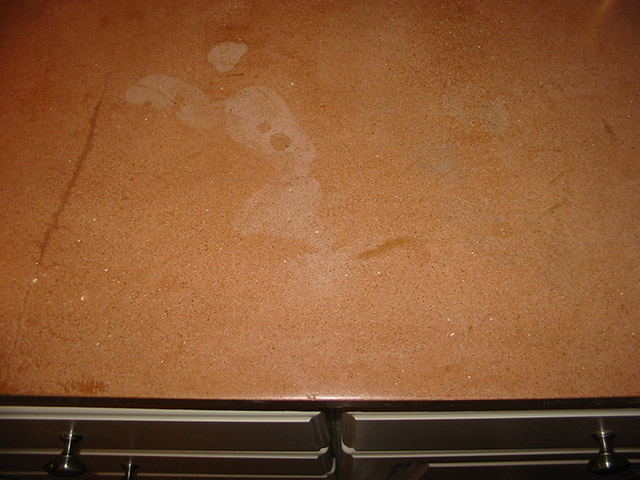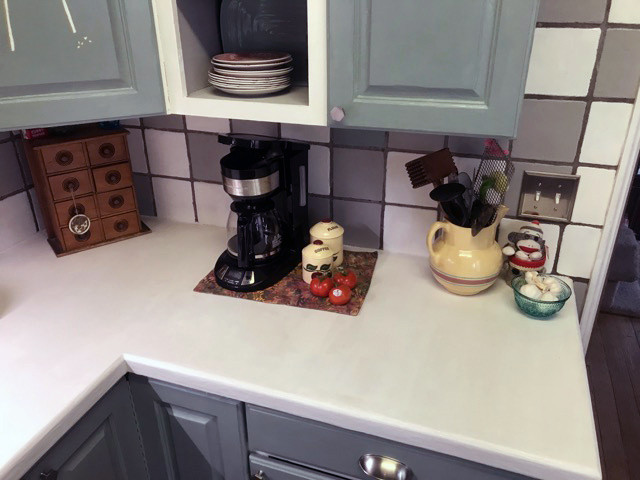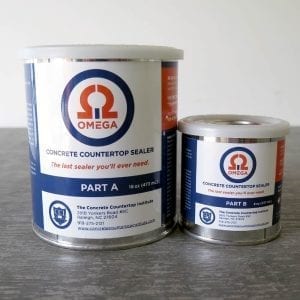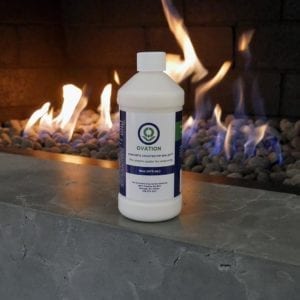The biggest mistake DIYers make with their concrete countertop projects has nothing to do with the concrete or the technique used to create the countertop itself.
The biggest mistake is choosing the wrong sealer.
Choosing the wrong kind of sealer will lead to disappointment and frustration, early failure, and possibly even prevent you from applying the right one in the future.
You don’t want to have to tear out what you did and start over, so don’t make a bad sealer decision that can ruin what you just made!
Tips for Success with DIY Concrete Countertops
Don’t do the following, so you won’t end up with this:
Concrete countertop “sealed” with wax.
– Don’t use wax on concrete countertops. Ever!
The use of wax on concrete countertops is one of the persistent myths that just won’t go away.
Wax does little to protect concrete. At best, wax is a dry lubricant that helps things slide over the concrete.
It can make the concrete look shinier and make water bead up. This is great for your car because rain beads up and runs off. However wax will do little to keep red wine, lemon juice and tea from staining your concrete countertop, or even permanently etching your concrete.
Wax gives you a false sense of security. All that effort to apply and buff it is wasted on a product that barely stops water and won’t stop stains.
Wax has been used on furniture for centuries, but it’s also long been known that wax is just a sacrificial application that doesn’t give much protection. If the fine woodworking industry has known that for so long, why should you adopt the ill-informed recommendations of an amateur blogger or well-meaning home-center employee?
– Don’t buy your concrete countertop sealer from a home center.
Their products are meant for sidewalks and garages, not for the demands of a concrete countertop. Many are acrylic sealers that are inexpensive, easy to put down, but don’t provide good protection.
Plus, acrylic is a soft polymer that wears off quickly. That’s why it is used as a mop-on renewable finish on commercial floors.
– Don’t use stone or tile sealers.
These “sealers” are penetrating repellants. This means they are designed only to keep liquids from penetrating the surface.
Sounds good, right? Except that acidic liquids like lemon juice, tea and wine are still touching the surface and are still able to permanently damage your concrete.
Read the fine print (or their FAQ) and you’ll learn they usually don’t promise great protection (often only “resistance”), and never any kind of real acid protection.
Granite isn’t affected by acid, and most tile grout joints don’t see food stains, so repellants don’t need to work very hard. A concrete sealer does.
Worse still, repellants keep good coatings from sticking, making future application of the right sealer difficult or impossible.
Don’t poison your concrete with a product meant for a different kind of material.
Do the following, so that you end up with a countertop that looks this great, and STAYS looking this great!
“I am a DIY-er, having recently completed covering my countertops with concrete (my first concrete endeavor). Somehow I missed your product when researching sealers and went with another sealer (BIG mistake). $150 later, i found it was not stain or scratch resistant at all. My countertops were a mess after a month. I saw your product and went for round two after sanding, cleaning up all the mars. Your instructions, videos were so helpful. I was nervous about jumping in, but it was seamless. Here is my finished product after a week. It passed the coffee, tomato sauce stain test today! Yay. I love the coverage and want to thank you for your awesome product and all the helpful instructions! Ive been singing your praises to all my DIY friends. Thank you! Thank you! Thank you!” – Lisa Townsend
– Do choose a finish designed for concrete countertops.
Concrete is a challenging surface to seal. And countertops need to look good and perform well in kitchens and bathrooms. This is entirely different than the appearance and performance requirements of concrete floor sealers.
Don’t use a repurposed floor or sidewalk sealer on your countertop. You’ll end up with something that looks like an elevated sidewalk.
– Do select a finish that demonstrates reliable and consistent performance.
You need to know what the finish can stand up to and how to maintain it. How will you clean it, or touch up scratches when they happen? Will it stand up to oil and acids? How about sunlight? Is this something you can rely on?
– Do use a food-grade finish that is water-based, easy to apply and looks great.
Avoid solvent-based finishes due to the toxic fumes during application, and from outgassing afterwards. Make sure the sealer instructs you how to apply it.
Which concrete countertop sealer should you use?
Our recommendation for DIYers is Ovation Concrete Countertop Sealer.
It’s designed for concrete countertops, food safe, easy to apply, and has good performance. It will keep your concrete looking good provided you clean up spills.
Our pro-level sealer is Omega Concrete Countertop Sealer.
It’s a bit more complicated to mix and apply because it’s a very high-performance finish designed for the professional.
Both sealers provide top-tier performance unmatched by anything a home-center sells, and anything most DIY bloggers recommend.
You can learn more about these sealers here:




